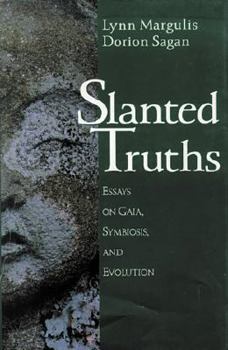Slanted Truths: Essays on Gaia, Symbiosis, and Evolution
Select Format
Select Condition 
Book Overview
Lynn Margulis and Dorion Sagan here present their fourth book as a writing team, a collection of their essays on Gaia theory, symbiosis, individuality, and the way science is practiced nowadays. Lynn... This description may be from another edition of this product.
Format:Hardcover
Language:English
ISBN:0387949275
ISBN13:9780387949277
Release Date:June 1997
Publisher:Copernicus Books
Length:368 Pages
Weight:1.62 lbs.
Dimensions:1.3" x 6.5" x 9.7"
Customer Reviews
1 rating
Big Trouble in Biology
Published by Thriftbooks.com User , 24 years ago
No scientist of our times has more right than Lynn Margulis to crow about her once-ridiculed but now-vindicated discoveries, such as the cell symbiosis hypothesis. Yet, for all her enthusiasm in promoting her now widely respected triumphs and her new, still-to-be-tested hypotheses, Margulis does not gloat. She is gracious with her opponents and generous in sharing credit with her grad students and other collaborators. One of the volume's most attractive features is that it summarizes the development to date of the views of James Lovelock and herself, on their widely debated and very influential Gaia hypothesis. We are treated to numerous fascinating anecdotes about the making of such a controversial theory, and about its reception (not always very polite, let alone friendly) by the community of "objective" scientists. The real gems of the book, however, are two autobiographical pieces by Margulis, "Sunday with J. Robert Oppenheimer" and "The Red Shoe Dilemma," and a third article "Big Trouble in Biology." In the first, we witness the encounter between the precocious sixteen year old future scientist Margulis and the recently deposed titan of atomic physics and "father of the atomic bomb" at his home in Princeton. The second piece offers Margulis's retrospective on what it meant to be a woman during our times who tried to be a great scientist, as well as a great wife and mother. Her spare use of words throws sharply into relief the realities still facing young women who would make a career in the sciences. Every one of those young women should read this book, and especially "The Red Shoe Dilemma." For any critics of the excesses of late-twentieth century reductionism in the life sciences, "Big Trouble in Biology" will be a call to arms, albeit a very thoughtful and provocative one. Lynn Margulis is no anti-science crackpot; nor is she a latter-day vitalist. But from one of the most successful practitioners in the methodology of reductionism, this heart-felt call for LOOKING at whole, living organisms and marvelling at their living qualities is a challenge that demands serious attention.





